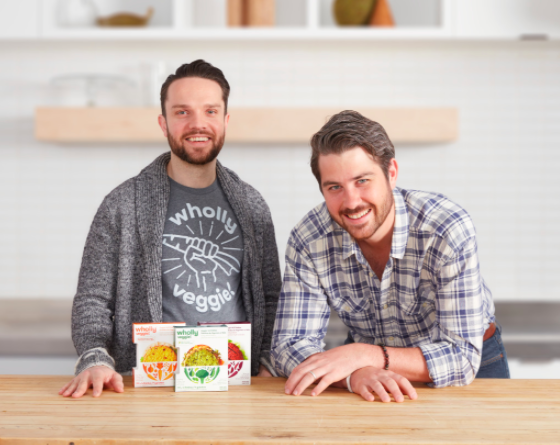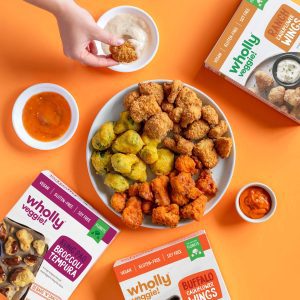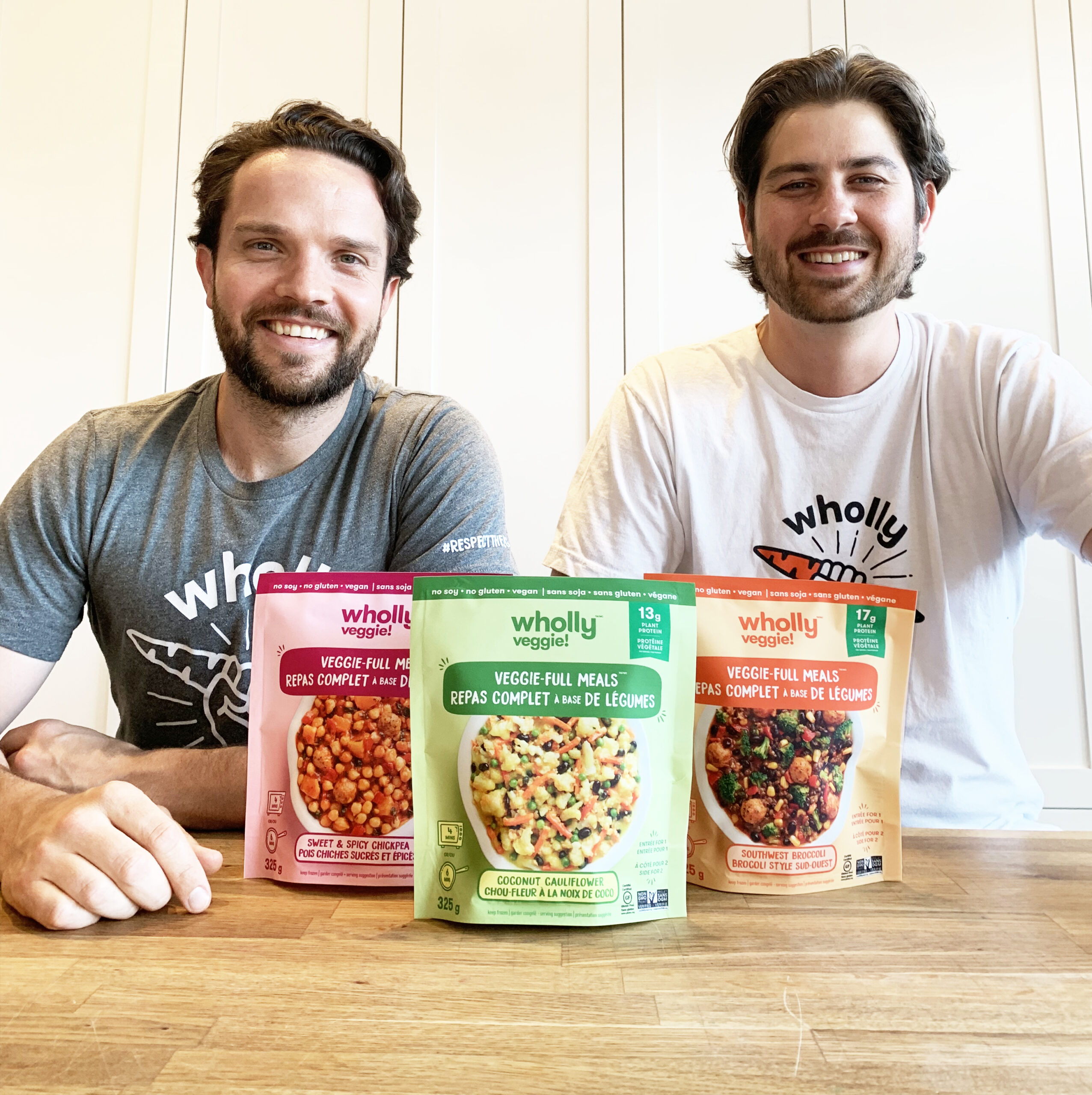[vc_row][vc_column][vc_column_text]Wholly Veggie makes vegetables the star of the show with their tasty and colourful products that are not trying to be meat.
David Gaucher and Johnathan Bonnell were working together at a start-up when Gaucher had dreams of creating a more sustainable and vegetable-filled future. Gaucher and Bonnell’s teamwork and camaraderie made it clear that they would be good business partners, and so they got to work.
“When we look back at it, that experience together allowed us to see the good, bad and ugly of each other before we decided to start a business,” said Bonnell.
The quest into the meat alternatives market started with long drives and hauling plant-based products across provinces and the U.S. border. Having sampled all of the competing products, they all came to the same conclusion.
“If vegetables are so colourful and diverse, why did everything in the category look brown and like meat?,” said Bonnell. “Why can’t we just let vegetables be vegetables?”
And so, Wholly Veggie was born.
With the help of a chef, and after 27 recipe trials, Wholly Veggie created three colourful, delicious and veggie-filled patties: Southwest Beet, Herby Garlic Greens and Sweet Curry Carrot.
The company began sharing Wholly Veggie patties at the Canadian Health Food Association trade show, at a booth made out of Ikea furniture. In just four years, they’ve grown into a multi-product food line with vegetarian or vegan patties, pizzas and bites that are sold in major grocery stores across Canada.
For this week’s Entrepreneur of the Week Spotlight, Bay Street Bull spoke with Johnathan Bonnell about entering the meat alternatives market, changing Canadian diets and learning how to #respecttheveg. [/vc_column_text][vc_text_separator title=”Q&A” color=”vista_blue”][vc_column_text]
The origin story of Wholly Veggie really comes down to you both taking a chance on the idea. What was it about each other that made you trust the other enough to get into business together?
Whenever we get together with other entrepreneurs, the topic of having a business partner usually comes up. The easiest decision we made was choosing to start a business together, however, this decision is not easy for everyone. For David and I, we had worked together in a startup-like environment for 4 years prior to starting Wholly Veggie. It was a boom and bust scenario that threw us into positions that were a bit over our heads and forced us to rely on one another to get the job done. When we look back at it, that experience together allowed us to see the good, bad and ugly of each other before we decided to start a business.
Unlike the many meat/ meatless alternatives out there, Wholly Veggie uses only vegetables. Why was it so important to guarantee that for customers and not go the route of chemically produced meat alternatives?
Funny enough, the original idea was to create a similar product line to Beyond Meat. We had phoned up a university and pitched the idea of having them work with us and spearhead the innovation. Shortly after, David and I met with a chef to review the competing products in the marketplace. We scoured every store in Toronto, Montreal and south of the border in Buffalo—which saw us get questioned for bringing back an abnormally high amount of plant-based burgers—and met at the chef’s garage with our findings. As we spread out the plant-based options on his garage table we all concluded the same thing: if vegetables are so colourful and diverse, why did everything in the category look brown and like meat? Why can’t we just let vegetables be vegetables? From there, the idea of making products that celebrate the vegetable was born, and so was our hashtag #respecttheveg.


Other than the ingredients list, what do you feel sets Wholly Veggie apart from other vegetable based food companies?
For many of the emerging and established plant-based food companies, the mission is the same: get people to eat more vegetables. Reduce meat consumption and make the planet a better place by reducing CO2 that comes from animal agriculture. At Wholly Veggie, our core difference is how we solve that problem. Our focus is not on trying to convert the entire world into veganism, but being an easy, and tasty way for anyone to add veggies into their diet at every meal. Our products look and taste like veggies, not like meat. They’re easy to incorporate into your diet, and are made of wholesome vegetables and ingredients you can pronounce.
What do you want Wholly Veggie to add to the food market that previously did not exist and how do you feel your company could change the way people think about/ consuming vegetables?
With the increased awareness around the benefits of adding more plants into your diet, our hope is that people begin to view vegetables less as a side to a meat protein, and more as a main for breakfast, lunch or dinner. A key way for us to do that is to continually offer customers new, innovative plant-based solutions across the frozen, fridge and shelf-stable aisles.
What do you feel is the biggest shortcoming in the food industry and what do you think would be the best way to rectify it?
Right now with COVID-19, the entire food supply chain is being stress tested. From ingredient suppliers, and manufacturers, to grocery stores and trucking companies, everyone has had to move at light speed to adopt new procedures or change suppliers. The one area that has been a shortcoming for years, but is now rapidly accelerating is eCommerce in the Consumer Packaged Goods (CPG) food industry. Pilot programs for home delivery are being compressed, and many brands have implemented Minimum Viable Product (MVP) models for offering their customers a home delivery option. All of this is going to see more options for customers coming out of COVID-19 and a more robust direct to consumer supply chain.
Both having respective careers before starting Wholly Veggie, there are sure to have been moments where you weren’t quite sure of your next step. How do you navigate self doubt or external doubts?
More than we can count! As a startup, if you don’t have that sense of fear then I think something is wrong. Having a bit of self-doubt is what keeps you on your toes. We knew going into this that the rate of failure was extremely high for small businesses, especially in the first two years. The only way to keep our sense of sanity was to set a series of milestones that could act as litmus tests for the health of the business. The one we remember the most was at our first trade show in Vancouver, CHFA West. At the time, David and I had an extremely finite budget and flew into Vancouver from Toronto on the cheapest flight we could get, picked up minimal items from IKEA to make our booth, and worked until the early hours of the morning piecing it together. We looked at each other before the show started and both agreed that if nobody liked our products, we’d shake hands, and call it day. Thankfully, people did, and we took off running from there. Today we still set milestones each month to further measure our goals and allow us to track growth.
What is the best advice you have received in your career and how has it influenced the way you navigate running Wholly Veggie?
Great companies are built on great cultures. Even when it was just David and me in his basement, we knew that the success of the company would be dependent on our ability to not only bring in great people, but to build a culture that fostered open ideas, creativity, and a belief that our company would help make the planet a better place.

Where would you like to see your company and separately, the food industry, be in the next 5 years?
Our goal is to be in the fridge and freezer of every Canadian looking to add more plant-based foods into their diet. I believe we’re already starting to see a shift from centre aisle shopping to more outer aisle shopping. This is forcing a lot of traditional CPG companies to clean up their ingredient decks to compete. Our hope is that in the next 5 years, the concept of clean ingredients and low sugar will be dominant throughout the grocery store.
What was the biggest challenge you faced when creating Wholly Veggie not only regarding the products but with branding? How did you both manage this?
For us, it’s been less about one challenge and more about a variety of fires that seem to come out of nowhere. At first, the reaction is to pin it on not catching any breaks or bad luck, but then you realize it’s a result of being too stretched as a startup, and not having enough resources to keep up. Our product and packaging is our main brand point with customers, so we take it very seriously when anything comes up. I remember the first run of packaging we ran had the wrong customer service number printed and when customers called, it went directly to a cruise ship line. Our reaction with any challenge has been to not panic, put in an action plan, and solve it. That may mean you win a free cruise when you call Wholly Veggie for a few weeks, but after that, we’ve figured it out.
Recent statistics have shown that the majority of Canadians do not understand what they need to ensure proper nutrition. Why do you think this is and what do you think should be step one in fixing that statistic?
For a lot of Canadians, we get mixed messages about what’s good or bad for our health. Low carb, high carb. Low fat, eat good fats. Margarine is better for you than butter. Only eat unsalted butter. I don’t think it’s a lack of desire to have proper nutrition, I just think that many of us don’t know what to do. Canada’s updated food guide has helped drive home a clear message to Canadians around healthy food, and a more balanced diet. Our next challenge as an industry and government is articulating this in the stores and helping people make easy, healthy choices when it comes to deciding what goes in your shopping cart.[/vc_column_text][/vc_column][/vc_row]













